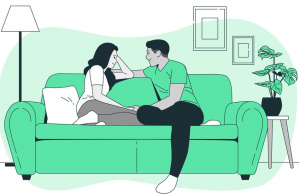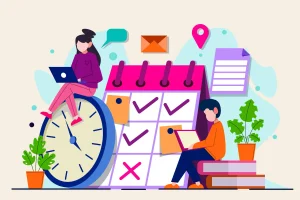5 Easy Steps to Overcome Obstacles in Couples Therapy Sessions
By Prapoorna M
Last Updated: June 3, 2024
Embarking on the journey of couples therapy can feel like navigating through a dense fog, unsure of what lies ahead. It’s a path chosen by many who seek to strengthen their bonds and overcome the hurdles that life inevitably places in their way. These obstacles, be they communication breakdowns, unmet expectations, or other challenges couples face, are far from unique. Yet, confronting and overcoming them together can profoundly enrich a relationship, fostering growth, understanding, and a deeper sense of connection.
The transformative power of couples therapy lies not just in resolving conflicts but in uncovering the hidden strength and resilience within a relationship. It’s about turning towards each other with openness and honesty, ready to navigate the complexities of human emotions and vulnerabilities. The journey through therapy can be as rewarding as it is challenging, offering insights and tools that contribute to a more fulfilling partnership.
Understanding the Importance of Couples Therapy
Before Practical Steps: The Impact of Couples Therapy
Couples therapy offers a unique and valuable space for growth, understanding, and healing that couples might not achieve on their own. It’s not about pointing fingers or placing blame but rather about exploring the dynamics of your relationship in a safe, supportive environment. Here, both partners are encouraged to voice their feelings, listen actively, and understand each other’s perspectives more deeply than they might in the heat of an argument or the silence of misunderstanding.
Uncovering Underlying Issues
One of the most significant benefits of couples counseling is its ability to bring to light the underlying issues that may not be immediately apparent. Through guided discussions and therapeutic techniques, couples can uncover patterns and behaviors that contribute to their challenges. This process fosters a deeper understanding of each other and the relationship as a whole, paving the way for genuine healing and connection.
Addressing Misconceptions About Therapy
Misconceptions about therapy often stem from societal stigmas or the fear of vulnerability. Some may believe that therapy will force them to change who they are or that the therapist will take sides. These myths couldn’t be further from the truth. Therapy is about facilitating change that aligns with the couple’s values and goals, and a skilled therapist remains neutral, offering insights and guidance without judgment.
Interactive Element: Take a moment to reflect on your initial perceptions of couples therapy. What feelings or beliefs come to mind? Are they influenced by common misconceptions, or do they stem from a place of hope and curiosity? Consider how challenging and reshaping these perceptions could open the door to newfound growth and closeness in your relationship.
Couples therapy is a journey of exploration, understanding, and, ultimately, transformation. It’s about building a stronger foundation together, armed with the tools and insights gained through the therapeutic process. As we move forward, remember that this journey is one of hope, a testament to the strength and resilience inherent in your partnership.
Step 1: Recognize and Embrace Your Role in the Relationship Dynamics
Embarking on the journey of couples therapy requires both partners to step into a space of vulnerability and openness. The first step in this transformative journey is to recognize and embrace your role in the relationship dynamics. This involves a deep dive into self-awareness and accountability, which are foundational elements for the success of therapy.
Understanding that the challenges you face as a couple are not solely the responsibility of one partner is crucial. It’s about identifying the patterns, behaviors, and responses that both of you contribute to the relationship, which might be contributing to its challenges. This step is not about assigning blame but about acknowledging that the dynamics of a relationship are co-created.
Approaching therapy sessions with an open mind and a willingness to explore both your and your partner’s contributions to the relationship’s challenges is essential. It’s about being honest with yourself and each other, acknowledging that change starts with you. This openness paves the way for genuine understanding and collaboration towards a healthier, more fulfilling relationship.
Interactive Element:
As you prepare for this journey, take a moment to reflect on the following questions:
- In what ways have I contributed to the challenges we’re facing as a couple?
- Am I willing to accept responsibility for my part in our relationship dynamics?
- How open am I to exploring both my own and my partner’s contributions to our challenges?
- What changes am I ready to make to improve our relationship?
Step 2: Commit to Honest and Effective Communication
Moving forward in our journey to enhance and rejuvenate the connection within your relationship, we arrive at a crucial milestone: committing to honest and effective communication. This step is about bridging the gap that miscommunications may have built, and it’s foundational for healing and growth in any partnership.
Emphasizing Honesty and Empathy
Communication difficulties often arise not from what is said but from how it’s conveyed. A cornerstone of repairing these rifts lies in fostering a culture of honesty and empathy within your relationship. Honesty allows for the genuine expression of thoughts and feelings, while empathy enables us to receive our partner’s messages with compassion and understanding rather than judgment or defensiveness.
Know more: Anger management in Adults | Controlling Anger
Constructive vs. Destructive Communication Patterns
Constructive Communication:
- Active Listening: This involves fully concentrating on what is being said rather than just passively hearing the message. Show you’re listening by nodding, making eye contact, and repeating back what you’ve heard to confirm understanding.
- I Statements: Express your feelings and needs without placing blame. For instance, “I feel hurt when plans are canceled at the last minute” rather than “You always cancel plans and don’t care about my feelings.”
- Expressing Needs Clearly: Clearly articulate what you need from your partner without expecting them to read your mind. This can prevent frustration and misunderstanding.
Destructive Communication:
- Blame and Criticism: Avoid statements that begin with “You always” or “You never,” as they accuse and generalize, leading to defensiveness.
- Stonewalling: Withdrawing from the conversation or the relationship to avoid conflict does not resolve the issue but rather exacerbates it.
- Contempt: Expressions of superiority, sarcasm, or mockery poison conversations and erode the respect between partners.
Interactive Element: Mini-Activity for Practice
A simple yet powerful exercise to enhance your communication skills involves expressing a need or a feeling to your partner without placing blame. Here’s how you can start:
- Choose a quiet time when both of you are relaxed and not preoccupied with other stresses.
- Think of a recent situation that led to misunderstanding or conflict.
- Reflect on your feelings and needs regarding the situation. What was it that you really wanted to express?
- Craft an “I” statement that encapsulates your feelings and needs. For instance, “I felt overlooked when we didn’t discuss the vacation plans together. I need to feel involved in our decisions.”
- Share with your partner, focusing on your tone and body language to convey sincerity and openness.
Know more on our article Rebuilding Trust In Relationship
Step 3: Set Shared Goals and Work Towards Them Together
The Importance of Shared Goals
Identifying and agreeing on common goals for therapy does more than just give you both a target to aim for; it serves as a compass that guides your therapy sessions. These goals help ensure that you’re both on the same page about what you want to achieve, whether it’s improving communication, rebuilding trust, or deepening emotional connection. By setting these goals together, you foster a sense of partnership and teamwork, reinforcing the idea that you’re in this together, working as allies rather than adversaries.
Shared goals also provide a framework for measuring progress. They offer milestones that you can look back on to see how far you’ve come, serving as reminders of your joint effort and dedication to improving your relationship. This sense of direction is invaluable in therapy, as it keeps the sessions focused and productive, ensuring that you’re both working towards outcomes that matter to both of you.
Fostering a Team Mindset
One of the most powerful aspects of setting shared goals is the way it fosters a team mindset. It shifts the focus from individual desires to what’s best for the relationship, encouraging both partners to support each other’s growth and success. This collaborative approach strengthens the bond between partners, as they see each other not as obstacles to their happiness but as integral to their shared journey towards a healthier, more fulfilling relationship.
Interactive Element: Jot Down Shared Goals
Now, let’s put this step into action. Grab a piece of paper and sit down with your partner to discuss and jot down a list of goals you both want to achieve through therapy. Consider the areas of your relationship that you feel need the most attention, and start from there. Here are some prompts to get you started:
- What do we want to improve in our communication?
- Are there specific issues or past hurts we need to work through?
- How can we better support each other’s individual growth while strengthening our relationship?
- What does a healthier, happier relationship look like to us?
Remember, these goals should be specific, measurable, achievable, relevant, and time-bound (SMART). They should reflect both your needs and aspirations, creating a shared vision for your future together.
Step 4: Practice the Skills Learned in Sessions
The Bridge Between Therapy and Daily Life
The skills and techniques introduced in couples therapy are designed to be tools that you can use not just within the confines of a therapy session but as part of your ongoing relationship dynamics. Whether it’s a communication method, a way to express empathy or techniques for managing conflict, these strategies become truly effective when they’re practiced in the context of your real-life experiences together.
Applying what you’ve learned requires both awareness and effort. It’s about catching yourselves in the moment and choosing to respond differently based on the insights and skills you’ve gained. This deliberate practice reinforces positive changes, making them more of a natural response over time.
Simple Exercises for Everyday Practice
To help integrate these skills into your daily lives, consider implementing simple exercises or methods that reinforce what you’ve learned. For example, if you’ve been working on active listening, set aside time each day to share something with each other without interruptions, summarizing what you’ve heard before responding. This daily practice can help to solidify your listening skills and demonstrate your commitment to understanding each other more deeply.
Interactive Element: A Weekly Challenge
One way to ensure these skills become a part of your relationship is to introduce a weekly challenge based on a specific skill discussed in your last session. For instance, if the focus was on expressing appreciation, challenge yourselves to point out one thing you appreciate about each other every day for a week. This not only helps to practice the skill but also creates a positive environment that nurtures your relationship.
At the beginning of the week, decide together which skill you’ll focus on. Write it down and place it somewhere visible as a reminder. At the week’s end, reflect on how the challenge went—what was easy, what was difficult, and how it felt to incorporate this skill into your relationship consciously.
Step 5: Trust the Process and Your Therapy Partner
As we round the corner to the final and crucial step in your couples therapy journey, it’s time to address a fundamental pillar of this transformative process: trust. Trusting the process of therapy and, equally importantly, trusting your therapy partner are key to navigating the challenges and obstacles that may arise.
The Virtue of Patience in Therapy
Embarking on couples therapy is a brave and significant step towards a healthier relationship. It’s essential to remember that progress is often gradual and comes with its set of challenges and setbacks. Like the ebb and flow of the tides, the journey through therapy can bring moments of revelation and periods of stillness. Embracing patience allows you and your partner to acknowledge and appreciate the small victories, understanding that each step forward, no matter how small, is a piece of the larger puzzle of your relationship’s growth.
Building Trust with Your Therapist
A successful therapeutic relationship is built on trust. Trusting your therapist as a neutral, supportive guide through your relationship’s complexities is vital. This trust enables a safe space for open, honest dialogue and vulnerability. It’s in this space that the most profound insights and breakthroughs can occur. Remember, your therapist is there to facilitate your journey, offering tools and perspectives that guide you toward understanding and connection.
Also Read: Relationship Counselling Online
The Power of Collaboration
Collaboration is at the heart of couples therapy. It’s about working together, not just as a couple, but as a team that includes your therapist. This collaborative effort ensures that both partners feel heard, understood, and valued throughout the process. It reinforces the idea that you’re both committed to navigating the therapy journey together, armed with mutual respect and a shared goal of a stronger, more resilient relationship.
Couples Therapy Milestones and Outcomes
| Milestone | Description | Expected Outcome |
|---|---|---|
| Initial Assessment | Understanding each partner’s perspective and therapy goals. | Clear direction for therapy sessions. |
| Communication Enhancement | Learning and applying effective communication techniques. | Improved understanding and reduced conflicts. |
| Setting Shared Goals | Identifying and agreeing on common objectives for therapy. | Focused efforts towards mutual relationship goals. |
| Skills Application | Practicing therapy techniques in real-life scenarios. | Strengthened relationship skills and resilience. |
| Ongoing Trust & Commitment | Continuously trusting the process and each other. | Sustained progress and deeper connection. |
Conclusion
As we reflect on the journey through the key steps to enhance and navigate the complexities of couples therapy, it’s vital to recognize the transformative potential of approaching therapy with openness and willingness to grow together. The essence of this journey—recognizing each partner’s contributions to the relationship’s dynamics, fostering honest communication, setting and working towards shared goals, applying new skills outside of therapy sessions, and trusting in both the process and each other—lays the foundation for a deeper, more meaningful connection. It’s a path that, while challenging, offers profound rewards in understanding, connection, and mutual growth.
Wellness Hub stands as your ally on this path, providing access to skilled therapists dedicated to supporting couples in their quest for a stronger bond. We invite you to share your journey, challenges, and successes, fostering a supportive community that thrives on shared experiences and collective wisdom. Your journey through couples therapy is not just a testament to your commitment to each other but a step towards a relationship enriched with deeper understanding and love. Let Wellness Hub guide and support you as you navigate this transformative process, building a partnership that’s not only resilient but also deeply fulfilling.
Frequently Asked Questions:
1. What Are the Key Steps to Overcome Obstacles in Couples Therapy?
The key steps include recognizing your role in relationship dynamics, committing to honest communication, setting shared goals, practicing skills learned in therapy, and trusting the therapy process and your partner. These steps foster a deeper understanding and connection between partners.
2. How Can Couples Improve Communication During Therapy?
Couples can improve communication by practicing active listening, using “I” statements to express feelings without blame, and engaging in exercises that promote empathy and understanding. Consistent practice outside of therapy sessions reinforces these skills.
3. Why Is Setting Shared Goals Important in Couples Therapy?
Setting shared goals provides a clear direction for therapy, ensuring both partners are working towards common objectives. It fosters teamwork and collaboration, helping couples navigate challenges with a united front.
4. How Long Does It Take to See Progress in Couples Therapy?
Progress in couples therapy varies depending on the specific challenges and the commitment of the partners to the process. While some couples notice improvements quickly, others may find it takes several sessions to achieve their goals. Patience and perseverance are key.
5. Can Couples Therapy Help If Only One Partner Is Willing to Participate?
Yes, even if only one partner participates, therapy can still provide insights and tools that may improve relationship dynamics. However, the most significant progress often occurs when both partners are engaged in the process.
6. How Do You Trust the Therapy Process When Progress Seems Slow?
Trusting the therapy process involves understanding that meaningful change takes time and that setbacks are part of the journey. Open communication with your therapist and celebrating small victories can help maintain trust and motivation.
7. What Should Couples Do If They Encounter Setbacks After Making Progress in Therapy?
Encountering setbacks is a normal part of the therapy journey. Couples should openly discuss these challenges in their sessions, apply coping strategies learned in therapy, and remind themselves of the progress they’ve made so far.
8. How Can Wellness Hub Help Couples Seeking Therapy?
Wellness Hub offers access to skilled therapists specializing in couples therapy, providing a supportive environment for couples to navigate their therapy journey. With resources, guidance, and expert care, Wellness Hub supports couples in achieving a healthier, more fulfilling relationship.
9. What Are Common Obstacles Couples Face in Therapy?
Common obstacles include communication breakdowns, unresolved conflicts, trust issues, differing expectations from therapy, and resistance to change. Recognizing and addressing these obstacles is crucial for making progress in therapy.
10. How Can Couples Prepare for Their First Therapy Session?
Preparation for the first therapy session involves setting clear intentions, being open to self-exploration, and discussing goals as a couple. It’s also helpful to reflect on what you both hope to achieve through therapy and to come with an open mind and willingness to engage in the process fully.
About the Author:
Prapoorna Mangalampalli
M.Sc., M.A., (Dual Masters in Psychology & English) – Counselor (6+ years of experience)
Prapoorna armed with a passionate dedication fueled by dual Master’s degrees in Psychology and English, Prapoorna sheds light on and elevates human experiences. Over 6+ years of experience fuel her insightful approach to counseling, offering profound empathy and guidance across diverse areas like online, marital, relationship, child, family, and career counseling.
At Wellness Hub, she thrives in a team environment that values innovation, compassion, and achieving results for their clients.
Connect with Prapoorna to learn how she can help you or your loved one find their voice and build a brighter future.
Book your Free Consultation Today
Parent/Caregiver Info:
Client’s Details:
* Error Message









